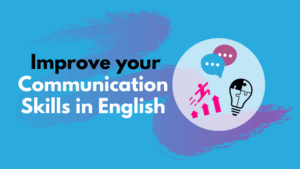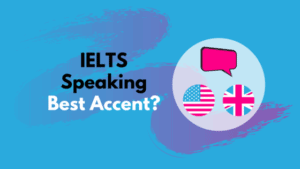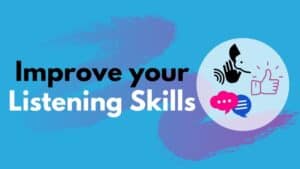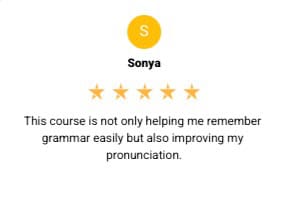15 Most Common IELTS Speaking Questions with Answers
👇 Take this lesson with you! 👇
In this lesson I will give you 15 of the most common IELTS Speaking questions with some awesome answers. These are also very common questions in real life, so you really do need to know how to answer them well.
A word of advice, if you are preparing for IELTS Speaking, do not learn or copy each answer completely; that really won’t help you.
Learn the vocabulary and expressions and then use them to practice giving your own answers. Flexibility and practice are the key to your success in IELTS Speaking.
Table of Contents
What do you do?
I work as a teacher in a local secondary school. I teach English and I am also responsible for developing the new curriculum there.
- I work as a ____
- I’m responsible for ____
I’m a full-time student at university and I am studying French and Japanese, and after graduation I really want to get into translating, I think it’s a fascinating field.
- to get into _____ (teaching, translating, politics, law) = to get involved in (a field of work, an activity)
I’m a stay-at-home parent actually. So, I look after the kids, get them ready for school and that, and I also do some volunteering work in our local community.
- Do volunteering work = do charity work, give your time for free.
Do you like your job?
Yes, I like it most of the time, I mean I really enjoy seeing my students learn and make progress but I must admit the hours are long and work often eats into my personal time.
Use Word Stress:
I like it most of the time
- I must admit
This phrase is used to make a contrast.
It is similar to ‘but’ and ‘to be honest’
- To eat into = to take up or use up (time, profit, resources)

What job would you like to do?
I haven’t really thought about that very much. Maybe a pilot, I think it’d be exciting to learn how to fly, not to mention to have a chance to travel around the world.
Use contractions:
- It would be = It’d be ____
- Not to mention = and also, and what’s more, and on top of that
What do you study?
Right now, I am doing a Master’s degree in accounting. It’s a part-time degree, as I am working too, so it’s always a balancing act between work and study, but I can just about manage it.
- It’s a balancing act = activity needs to balance two situations or requirements
- Just about = almost, nearly
What kind of accommodation do you live in?
I live in a flat, slap bang in the centre of town. It’s a basic two-bedroom apartment, with a nice kitchen and one bathroom. It has all the main mod-cons.
- To be slap bang in the centre = right in the centre
- The mod cons = the modern conveniences (e.g. air conditioning, heating, hot water…)
What part of your home do you like the most?
I’d have to say the lounge. It has a really comfy sofa and that’s where I chill out and spend most of my downtime, as well as watch TV with my family.
- Comfy (adj.) =comfortable
- To chill out = to relax
- Spend my downtime =free time, time not working

What do you do in your free time?
I’m a film buff, so I watch lots of movies, but apart from that, I also like to go down the gym and work out on the treadmill and do some weights whenever I have time.
- A film buff = a fan, expert of films
The word ‘buff‘ is commonly used with the following; a movie, history, car, or computer buff
- Apart from that = In addition to, as well as
Do you prefer to spend time with friends or family?
That’s hard to say. I enjoy spending time with both to tell you the truth. I’d probably say, overall, I strive to spend more time with family, and that means sometimes I do neglect my friends.
- To tell you the truth = To be honest, frankly speaking
- To strive (to do something) = to try hard
- To neglect = to ignore, not pay attention to
What’s your morning routine?
I aim to get up around 7am, I go for a brisk walk every morning without fail. Then I get back, I tend to have breakfast on my own, as everyone is still asleep. After that, I start work.
- A brisk walk = a quick walk
- Without fail = Always, no exceptions, religiously, ‘come rain, come shine’
- On my own = Without other people, by myself

How do you stay fit and healthy?
As I mentioned before, I like to work out at the gym. On top of that, I do take care with what I eat. I like to cook healthy food at home, plenty of vegetables, some meat in moderation and I try, to eat a piece of fruit every day.
- To take care (with something) = pay attention to and be careful with
- To do something in moderation = not too much, not too little
Did you do any sports as a child?
Yes, we used to play football at school, that was the main sport, although I also played cricket in the summer, but I wasn’t very good at it at all. I never really got the hang of it.
Express the past:
- I used to _____
- I did _____ (simple past)
- To get the hang of = to learn how to do something (usually something technical)
What kind of music do you like?
All sorts, to be honest. I used to be really into jazz, but nowadays I tend to listen to more classical music. I find it good for studying and relaxing. I often put some on in the background when I am working.
- All sorts = all kinds
- I find it ____ = I think it is ___

What’s your favourite kind of weather?
I actually like cold weather and I love it when it snows. So long as I’m wrapped up warm, I love to go out in the snow, and if my daughter is up for it, we will make a snowman together.
- I love it when _____
- To wrap up warm = to put on warm clothes
- To be up for something = to be ready and willing to do it
Which city would you like to visit in future?
There are so many, but if I had to choose one, I’d say Lima, in Peru, and maybe one or two other neighbouring cities. I’ve never been to south America, but I have seen so many breathtaking photos of Peru, I think that’d be my top choice.
- neighbouring (adj.) = nearby
Use contractions:
- That would be = that’d be
Are clothes important to you?
If I am going to be honest, not really. I don’t think I am fashion conscious at all, for me clothes are just something practical, so long as I look neat and tidy, that’s fine. I don’t pay much attention to coordinating colours or wearing the latest style.
- If I am going to be honest = To tell you the truth
We can use ‘at all‘ at the end of a clause to make a mentioned negative stronger, for example
- I am not happy at all
- I don’t like it at all
I hope you find these IELTS Speaking questions and answers useful. Remember, in IELTS Speaking Part 1 you want to use vocabulary that fits the context, so although fancy, topic-related vocabulary, such as ‘fashion conscious’ and ‘coordinating colours’ can be used to talk about clothes, you want to focus more on natural, everyday vocabulary because you are talking about your everyday life. Such phrases as, ‘I love it when’, ‘I find it interesting’ and ‘I don’t like it at all’ can be useful.
Let me know what you think in the comments below.

Improve your Speaking Skills with this Free Course
Crack IELTS Speaking Part 1
Learn to Speak with Confidence in Part 1 of Your IELTS Test!
⭐️⭐️⭐️⭐️⭐️
‘It’s such a great course. I’ve learned so many usages for speaking part 1.’
Zu Htet






2 thoughts on “15 Most Common IELTS Speaking Questions with Answers”
I get the right source now what i have been searching for six months. To be honest It’s very helpful for a ielts candidate.
Great – pleased to hear that!